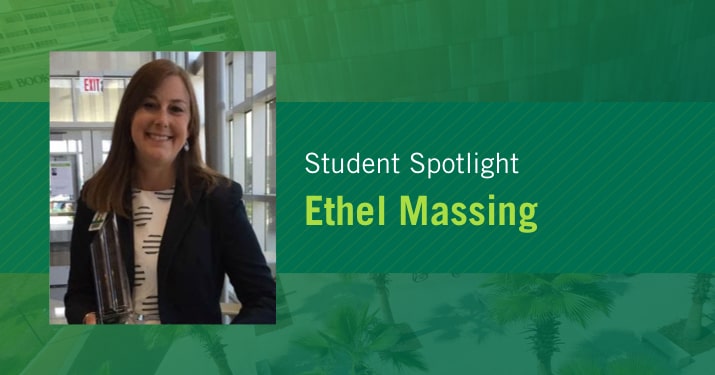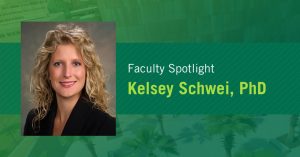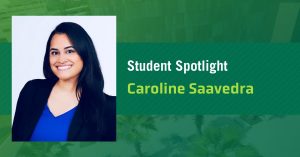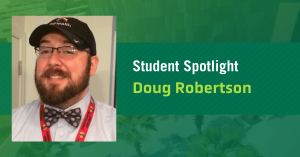While a background in healthcare or technology is certainly beneficial to someone pursuing a Master of Science in Health Informatics, Ethel Massing is proof that it isn’t the only thing that matters.
As a former educator, Massing’s undergraduate degrees were in early childhood education and elementary education. She taught everything from kindergarten to GED classes over her 13 years in education and spent the last three of those years working as a staff developer, training teachers. It was there she realized that she enjoyed teaching adults, which led to her pursuing a position with Parkview Health in Fort Wayne, Ind.
“I was brought on as a trainer for the new EMR (electronic medical record) implementation they were undergoing,” Massing said. “I spent my first 18 months at Parkview training physicians on the outpatient and inpatient sides of the EMR, much of that time training cardiologists. When a new cardiology module was planned for the EMR, I transitioned to an analyst position on the build team. I helped to design the cardiology system and created all the training materials.”
Last year, Massing was promoted to the position of Information Services (IS) Specialist at Parkview Heart Institute, where she occupies a hybrid role in which she is embedded in the leadership team. She works closely with the Heart Institute’s leadership to plan IS projects related to their strategic initiatives, managing IS projects to ensure broader business goals and objectives are supported from the information services side.
“The projects range from EMR implementations, software upgrades, hardware installations, and new site builds,” Massing said. “Since almost everything touches IS, I definitely stay busy! I have also been working on LEAN and optimization initiatives, making sure we’re using our EMR to its fullest potential.”
Discovering the Benefits of a Master’s Degree
Getting a master’s degree in informatics seemed a natural fit for Massing as she was already working in information services.
“Since my undergraduate degrees and experience were all in education, I thought I needed some kind of formal healthcare or clinical training if I was going to pursue any further career advancement in the healthcare industry,” Massing said. “Plus, with the exponential growth in EMRs and health information, I thought a degree in that field would really make me stand out as a candidate for future jobs.”
Her choice to attain a degree from the University of South Florida has already paid dividends. In her new position, Massing uses the tools she acquired at USF each day. Be it project management, legal requirements for medical record-keeping and compliance with regulatory standards, workflow modeling, change management, data querying or even communication strategies, Massing is ready for anything that comes her way.
“I never know what I’ll be called on to do,” Massing said. “Yesterday it was dealing with a vendor to set up a new DICOM transfer. Today it was scoping a cardio-oncology project. Each of my classes gave me a necessary “puzzle piece” which put together make me a very well-rounded health informatics professional with a broad knowledge base.”
For others currently on the ground floor of health IT or considering a transition into the field from an unrelated area, Massing has some words of wisdom to impart after seeing the growth of the industry as a whole and, in particular, her own team over the last few years.
“Even if you’re not currently working in healthcare, you likely have skills that are transferrable,” Massing said. “Good at fixing computers or IT problem solving? You could work on a field support team or on the help desk. Great with numbers and data? You could become a business intelligence analyst and build reporting tools. The possibilities are endless.”
Why Massing Chose USF
Massing was attracted to USF due to its reputation as top-tier school and the fact that the informatics program is the only of its kind to be offered through a medical school.
“I looked for a master’s program for a few years,” Massing said. “I carefully reviewed over 20 Healthcare/Health Informatics programs. In fact, people still ask for my “masters programs” spreadsheet when they’re considering programs for themselves. The spreadsheet is an Excel document I created to rate and compare each master’s program over 10 different categories. I chose USF’s program because the cost was reasonable, it took less than two years to complete, and it was all online. It was also a big plus that USF was the only school that offered their program through a college of medicine.”
Of the coursework, her favorite aspect was the project management curriculum.
“Coming from education, I really didn’t know much about project management before I took that class,” Massing said. “I really enjoyed it and found I have a knack for organizing people and tasks. I like it so much, I’ve decided to go for PMP certification (Certified Project Management Professional).”
When she’s not organizing projects or building new EMR systems, Massing is likely to be in the water, propelling a canoe or kayak at high speeds. She’s a former Indiana state champion in sea kayak racing and is currently a member of a rowing crew.
“I placed nationally in kayak and canoe racing,” Massing said. “I recently joined an adult crew team and started rowing. I recruited one of my cardiologists, and he’s now my rowing partner!”
Interview with Ethel Massing
We asked Ethel some industry-related questions to learn what she’s excited about in health IT and what she took from her experience at HIMSS18. Some of her answers are below. Hear more of Ethel’s story in our Facebook Live video from the annual HIMSS conference.
What are some developments in the world of Health IT that excite you and what do you think will have the biggest impact on your work?
Telemedicine really is the wave of the future. My cardiologists are already able to do tele-consults for patients in our community hospitals. They use a remote stethoscope, cameras, and other technology to diagnose and care for patients. This program allows them to treat patients where they are and reduce unnecessary transfers.
We’re looking for other ways to treat patients “where they are” including virtual visits, wearable devices, and monitoring devices (like scales and blood pressure cuffs) that will transfer information directly to our EMR and allow us to remotely monitor our patients’ health. As payment bundling and reductions in reimbursements continue, we have to find innovative ways to reduce our costs and keep our patients healthy.
As someone who works closely with information systems, what would you say are the biggest hurdles for implementing new technology for improved care?
The biggest hurdle has to be the competition for scarce resources. Even though IT departments have grown over recent years, they haven’t grown fast enough to keep up with the explosion of technology. Because of the HITECH act, most of the IT resources have been spent the last several years on large-scale EMR implementations. Continued updates to the EMR have led to slow growth in other areas like expanding mobile platforms, updating third-party software, or even replacing outdated hardware.
You attended HIMSS18 in Las Vegas, your first HIMSS conference experience. What was your favorite part of that experience? Your biggest takeaway?
My favorite parts of the trip were the opportunities to connect with other health IT leaders. From the Communities Carnival, the HealthIT Chicks Meetup, the Women in Health IT networking party, or the combined luncheon between INHIMSS (Indiana chapter) and KYHIMSS (Kentucky chapter), I enjoyed meeting others in the field and learning how they’re innovating in their health systems.
My biggest takeaway from HIMSS18? Technology innovations happen rapidly, and the healthcare industry simply has to do more to keep up. Eric Schmidt’s message during the opening keynote really hit home when he said, “You’re late!”
Attending HIMSS18, you see the current state of health IT and then you see the direction many envision it heading. What role do you see educators such as USF playing in an industry that is evolving so quickly and growing in importance?
I think USF’s program plays a key role in providing a basic platform of knowledge for health informatics professionals. The healthcare field creates terabytes upon terabytes of data per day. If that data is actually going to make a difference for healthcare systems and patients, it’s going to take a large group of trained health informatics professionals (like those coming out of a USF program) to turn that data into knowledge in order to start making positive impacts on the healthcare industry.



